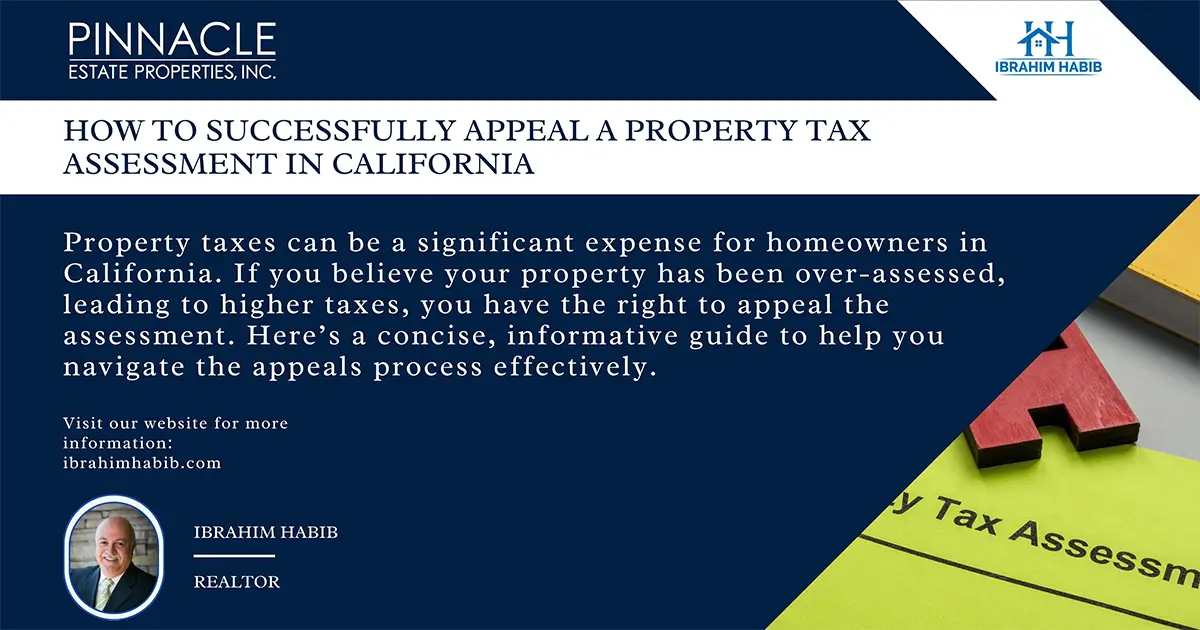Property taxes can be a significant expense for homeowners in California. If you believe your property has been over-assessed, leading to higher taxes, you have the right to appeal the assessment. Here’s a concise, informative guide to help you navigate the appeals process effectively.

Understand Your Property Tax Assessment
Before you begin the appeals process, it’s essential to understand how your property was assessed. In California, property taxes are based on the assessed value of your property as of January 1st each year, reflecting its market value on that date.
- Review Your Assessment Notice: Check the notice from the county assessor’s office, which details your property’s assessed value and the tax rate.
- Know Proposition 13: Under Prop 13, annual increases in assessed value are capped at 2% unless there’s a change in ownership or new construction.
Gather Supporting Evidence
To challenge your property tax assessment, you need strong evidence demonstrating that your property was over-assessed.
- Comparable Sales (Comps): Find recent sales of similar properties in your neighborhood. Look for properties with similar size, age, condition, and location.
- Independent Appraisal: Consider hiring a licensed appraiser to get a professional estimate of your property’s market value.
- Property Condition Documentation: Take photos and keep records of any issues that might lower your property’s value, such as structural problems or needed repairs.
File Your Appeal
Each California county has its own process and deadlines for filing a property tax appeal. Typically, you must file with your county’s Assessment Appeals Board.
- Get the Right Forms: Visit your county assessor’s website to find the necessary forms, usually the “Application for Changed Assessment.”
- Meet Deadlines: Filing periods generally run from July 2 to September 15, but check with your local assessor’s office for specific dates.
- Submit Your Documentation: Along with your appeal form, include the evidence you’ve gathered to support your claim.
Prepare for Your Hearing
If your appeal is accepted, you’ll be scheduled for a hearing before the Assessment Appeals Board. Preparation is key to a successful appeal.
- Organize Your Evidence: Ensure your evidence is well-organized and easy to present. Summarize key points to highlight during the hearing.
- Practice Your Presentation: Be ready to explain why your property was over-assessed and how your evidence supports this.
- Maintain Professionalism: Approach the hearing with a respectful and professional attitude. A well-prepared and courteous appellant is more likely to make a positive impression.
Attend the Hearing
At the hearing, you’ll present your case to the Assessment Appeals Board.
- Present Your Evidence Clearly: Focus on the most compelling evidence and explain it concisely.
- Answer Questions: Be prepared to answer questions from the board members for clarification.
- Listen to the Assessor’s Case: The county assessor will also present their evidence. Be prepared to address their points if needed.
Await the Decision
After the hearing, the Assessment Appeals Board will review all evidence and make a decision, which can take a few weeks to a few months. You will receive their decision in writing.
- Successful Appeal: If your appeal is successful, your property’s assessed value will be lowered, reducing your property taxes.
- Unsuccessful Appeal: If your appeal is denied, consider whether to accept the decision or seek further legal advice on additional steps.
Conclusion
Appealing a property tax assessment in California requires careful preparation and understanding of the process. By gathering solid evidence, meeting deadlines, and presenting your case effectively, you can improve your chances of a successful appeal. Remember, the goal is to ensure your property is assessed fairly and accurately, reflecting its true market value. For further assistance, consider consulting with a property tax professional or attorney specializing in property tax appeals







